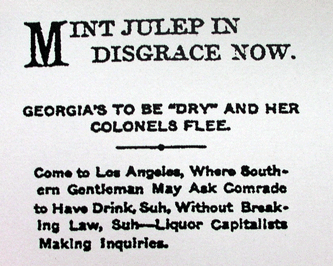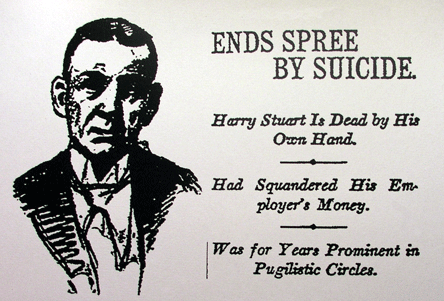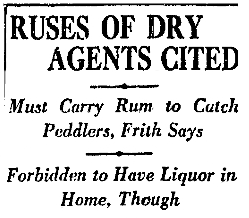August 14, 1907

Los Angeles
Colonel and Cracker alike are swarming our borders!
Dateline—The Peach State—Sherman’s march to the coast was less an indignity than that done by the last state election: all liquor establishments are to be outlawed on January 1. Now the march is of capital out of Georgia—an estimated $3,000,000 in taxes and licenses in 08. As the steady, self-righteous hand of the WCTU has not as yet clamped itself upon the great metropolis of Los Angeles, wholesalers and barmen alike are arriving en masse.
Those in the LA liquor trade welcome our Reb brethren, at least so that they may assure their bit by securing locations and concessions for the newcomers. The local liquor lobby has hit up City Hall for an extension of the Liquor Zone, and has petitioned to increase the number of saloons in LA to 250.
Despite a collective Angeleno fondness for drink, it is the civic duty of 1947project to provide a temperance lesson:
Some years ago, Harry Stuart was a pugilist of renown, his nose broken repeatedly in the ply of his noble trade. Then, as a barkeep on West Third, he was LA’s authority on the pugilistic arts, and oft served as referee for Tom McCarey’s Fight Club, which held forth in the old Hazard’s Pavilion (in 1907 the site of the great Auditorium facing Central Park). Stuart was famous for the way he yelled “b-r-e-a-k!” that amused spectators; his downfall was an unpopular decision in the ring which awarded a trophy to colored boxer Billy Woods, over Al Neil.
Bad luck turned worse after Stuart built a fight club at the westerly end of the Third Street tunnel, which prompted uproar from the tony neighbors. The City Council passed an ordinance confining such clubs to a certain district in the Eighth Ward. To make matters all the more discouraging, Stuart was stung by a spider on his left eye, destroying the sight thereof.
He found menial employment soliciting monies for a weekly publication, and after collecting nearly $100 ($2,052 USD 2006), decided to go on the drinking spree to end all drinking sprees. It lasted three weeks.
After the money was gone and the booze was consumed, he wrote notes to his wife in San Francisco, the Los Angeles Coroner, and his employer. In them he stated that drink had put him “down and out” and that he had nothing to live for. From his note to the Coroner: “Booze has been the cause of my downfall, and I am daffy…my wife will meet the expense of having my worthless body burned.”
Stuart, after losing his last fight, this one to a bottle, swallowed a solution of bromide in his Bunker Hill room at 244 North Grand.

 If the drys are gonna catch the wets, they’re gonna have to wet themselves. So to speak.
If the drys are gonna catch the wets, they’re gonna have to wet themselves. So to speak.









